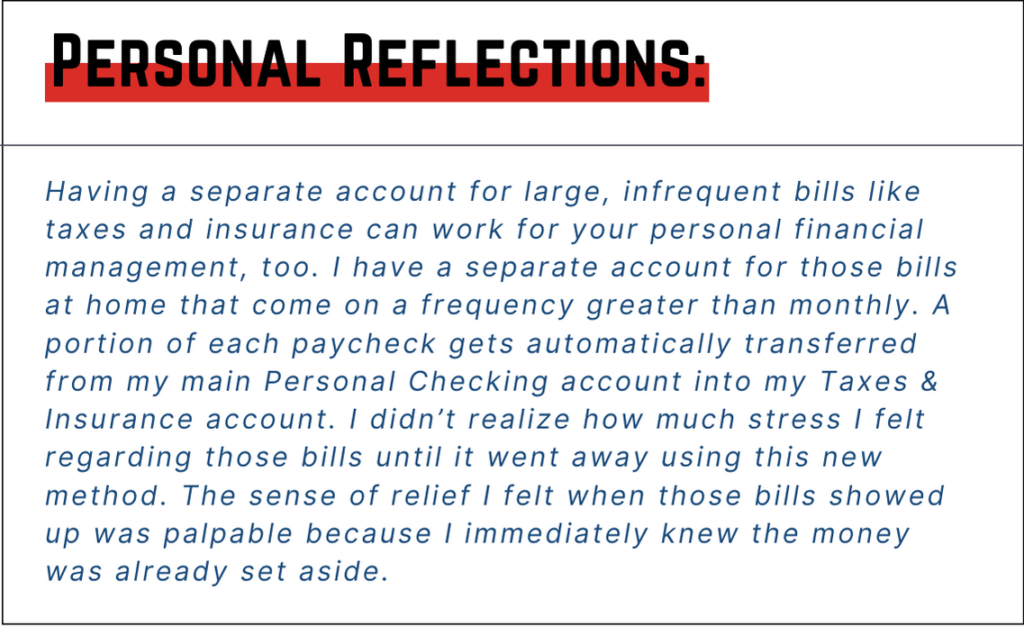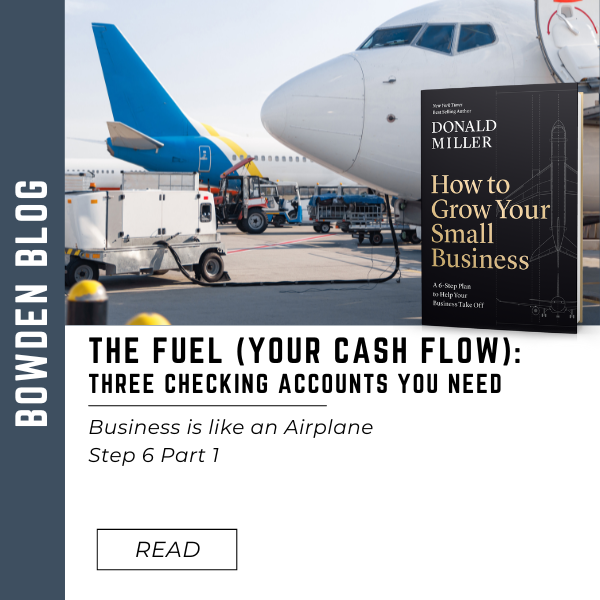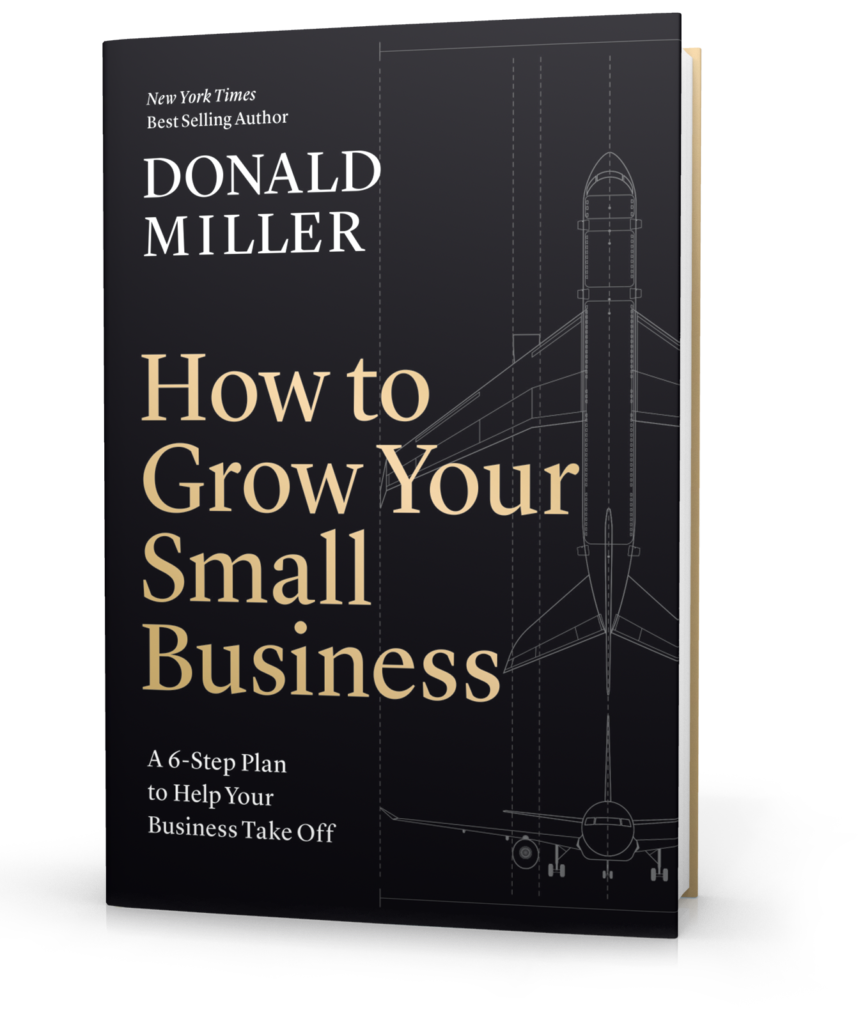In a business, cash equals fuel. If you have cash, your airplane can keep flying. If you don’t, you’re going to crash. From very small businesses to large ones, managing cash is critical to success, no matter the trajectory of your business airplane.
As an entrepreneur, you’re likely good at creating a way to make money in your business, but if that money is not managed well, it’s easy to get into trouble. Additionally, profit and loss statements from your accountant may not actually help you make decisions. Having a solid playbook for managing your business and personal finances can help. You need visibility on the day-to-day financial health of your business, money for taxes, and the understanding of how to use your profits to put your business on a path for growth.
In this Series, we’re reviewing the 6-Step Plan to run your business from Donald Miller’s latest book, How to Grow Your Small Business, and the online platform at businessmadesimple.com.
The analogy of an airplane helps describe the 6 Steps needed to run your business effectively and this week, we’re continuing with our final installment in Step 6, the Fuel, Your Cash Flow.
In this opening part of Step 6, Don introduces the first three checking accounts you need to run your business from the Small Business Cash Flow Made Simple Playbook:
- Your Operating Account
- Your Personal Checking Account
- Your Tax Account
These accounts will help you make sure you separate your business’s money (Your Operating Account) from your personal money (Your Personal Checking Account), and from the government’s money (Your Tax Account). You probably already have a main business account and a personal checking account, but specifically naming them as shown and adding the Tax Account are important steps to clarify the differences between personal funds and business funds.
In larger businesses, it’s unlikely that you are using the business’s money and your personal money interchangeably, but it’s very important that they remain separate in any size business. Establishing these three accounts and using them as a part of the Small Business Cash Flow Playbook will ensure you always have visibility into the financial state of your business and a clear delineation of money available to pay taxes.
Your Operating Account
Your Operating Account serves as the primary financial hub for all your business-related transactions. Setting up this account is crucial for segregating business finances from personal ones, ensuring clarity in tracking revenue, expenses, and overall cash flow. Regularly monitoring and managing the Operating Account allows you to have a real-time understanding of your business’s financial health, separately from your personal financial health. Having the Operating Account as the business’s main account makes it easier to make informed decisions, whether about investments in the business, expansions, or cost-cutting measures.
Your Personal Checking Account
Your Personal Checking Account is essential for you, as the business owner, to manage your personal finances separately from the business operations. By establishing this account, you can pay yourself a fixed salary, ensuring that your personal financial needs are met without compromising the business’s financial stability. This clear distinction between personal and business finances not only simplifies accounting and tax processes, but also provides a clearer picture of the business’s actual profitability and sustainability.
Your Tax Account
Your Tax Account is a dedicated account set up specifically for handling tax-related finances. Given the complexities and intricacies of tax obligations, it’s important to have a separate account where funds meant for tax payments are set aside to avoid inadvertently using them for other purposes. By regularly transferring a portion of income into the Tax Account, your business can avoid the stress of large, unexpected tax bills. This proactive approach ensures that when tax season arrives, the necessary funds are readily available, preventing potential financial strain or penalties.
Concern about tax bills is a notorious stressor for small business owners and the peace of mind that comes from setting aside money ahead of time will remove that potential headache from your life.

Pay Yourself a Fixed Salary
As you establish these first three checking accounts, it will be important that you designate a fixed salary to be transferred from the Operating Account to your Personal Checking Account. It can be weekly, bi-weekly, or monthly, depending on your preference, but it’s recommended to make it an automatic transfer.
Striking a balance between your personal financial needs and the demands of your business can be a delicate act. Paying yourself a fixed salary is a strategic approach to ensure this balance. By determining a consistent and reasonable amount based on both personal expenses and the business’s revenue, you can maintain your personal financial stability without draining the company’s resources. This fixed salary acts as a predictable expense for the business and aids in budgeting and financial forecasts. Moreover, it instills discipline in financial management, preventing impulsive withdrawals that could disrupt cash flow.
It’s important that you select an appropriate fixed amount. Too large a salary can put undo pressure on your business. Too small a salary can add pressure to your personal spending and might tempt you to make additional transfers out of the business. It may take a few weeks or months of experimenting to determine the proper amount. By committing to an appropriate fixed salary, you can enjoy the dual benefit of personal financial security and a business poised for sustainable growth.
Final Thoughts
Step 6 from Donald Miller’s book, How to Grow Your Small Business, is the Fuel – Your Cash Flow. We’ve discussed the Small Business Cash Flow Made Simple Playbook, a process to run your business using the first three bank accounts from the playbook:
- Your Operating Account
- Your Personal Checking Account
- Your Tax Account
We’ve discussed the importance of keeping the money of the business separated from your personal money. It’s also crucial to set money aside for taxes, so you don’t get stressed or surprised when tax payments are due.
Once your accounts are established, we reviewed the importance of establishing a fixed personal salary for yourself. Transferring that amount consistently from your Operating Account to your Personal Checking Account is an important first step in managing your business and household finances separately.
Next week, we’ll move onto the next step of the Small Business Cash Flow Made Simple Playbook: what to do with your business profit. You’ll see how to deal with profit as you make it, so that you maximize the opportunities profit provides, and ensure you never run out of fuel.

